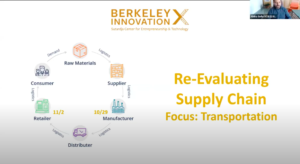The COVID-19 pandemic has substantially disrupted the global supply chain. Within a matter of months, the transportation, logistics, and manufacturing industries have gone through rapid and accelerated transformation. New questions and opportunities are now coming up for the future of the supply chain. How has the role of the supply chain evolved in the current pandemic? How is the industry innovating to deal with the key challenges? How can academia and industry be better partners? What business benefits should organizations expect from their investments in innovation? What lies ahead?
This week, the Sutardja Center for Entrepreneurship and Technology organized a roundtable discussion on ‘Reimagining Education.’ The conversation was moderated by SCET lecturer and founder of PINC, Aleks Gollu. Alongside Aleks, several distinguished panelists – Bart de Muynck (VP Analyst at Gartner), Matt Yearling (CEO at PINC), Jett McCandless (CEO of Project44), Robert Leachman (Professor at UC Berkeley), Ashish Chona (Senior VP at ORBCOMM) – engaged in discussions surrounding the future of supply chain, from real-time transportation visibility to IoT intelligence, due to the Covid-19 pandemic.
The roundtable started with a discussion on various aspects of the supply chain. A few interesting data points that came up regarding the supply chain in the US:
- The logistics industry in the U.S. represents approximately 10% of the GDP or close to US$ 2 trillion – comparable to Italy or Canada’s nominal GDP.
- Trucking moves a whopping 71% of all the freight in the US, and accounts for nearly 6% of all full-time jobs in the country. That translates into an $800B industry moving over 1 billion trailer and container loads in any given year.
The focus of the hour-long fire chat was how can innovation help organizations transform the supply chain for the future. A few important takeaways from the roundtable conversation:
- Typically, transportation execution is a multi-party, multi-tier effort that occurs among many supply-chain partners. In our current reality, pure efficiency is no longer sufficient, agility and adaptability have come to the forefront. As a result, supply chain executives have been heavily investing in automated execution and real-time visibility technologies to continue moving inventory and delivering on customer expectations.
- The supply chain is a backbone to every aspect of American life. The impact of the pandemic accelerated the digital transformation of the antiquated trucking industry. The rise of Uber Freight and various other companies operating in the logistics space helped the metamorphosis for the freight network industry.
- The future of automation and autonomous driving, via the integration of artificial intelligence in vehicles, will help the trucking industry evolve further within the next few years, creating a more efficient system for transportation.
The roundtable conversation then proceeded towards tangible solutions for industry players and what the future of the transportation industry would look like post the pandemic. To hear more about how the supply chain will be revolutionized over the long-term, do check out the event recording and hear from our esteemed panelists below!
The Berkeley Innovation-X Initiative is focusing on ‘Innovation that Matters’ to help organizations adapt to make the biggest impact for industry and society now.

